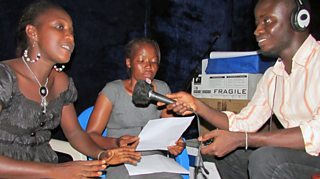
I have a strong bond with my mother and we are often in contact. She lives in the city of Makeni, northern Sierra Leone and I live in the capital, Freetown, a two hour drive away.
When she called me in September, in tears, I knew something was very wrong. “My family is being wiped out,” she told me, barely able to get her words out. Since August - in just a matter of weeks - 16 of our family members living in the town of Port Loko had died. They lived very close to one other in a densely populated area.
There were rumours of witchcraft. People were saying a “witch plane” had crashed and this had led to the deaths. A “witch plane” is quite difficult to explain but people think it is basically a form of supernatural “flight” that only those involved in witchcraft can see. Many people, including my mother, believed this is why my family had died.
I was frightened and depressed by my mother’s phone call. For the past six months, I’ve been producing radio programmes to give people information about the Ebola virus and encourage them to follow healthy behaviour related to prevention and treatment.
I strongly suspected my uncles, aunts and cousins had died of Ebola. It took me all my powers of persuasion to convince my mother not to visit her family, not to go to a burial or to touch any dead bodies, until I found out more.
Conflicting information
What I discovered upon contacting old friends, medical people and fellow journalists in Port Loko, shocked me. Even enlightened, educated people were talking about witchcraft, saying my family was cursed.
What really happened is as follows. My cousin, a woman in her early twenties, went into hospital in August and was later discharged. She died days later. Her mother who had cared for her during her illness also fell sick and died; her aunts who had washed her body died. Everyone who had come into contact with her died one after another. We later heard the nurse who had treated my cousin at the hospital was also dead.
I couldn’t – and still can’t - shake off the feeling that people were dying because of ignorance. People in Port Loko had heard of Ebola but the information they were getting was conflicting and often highly politicised. They just didn't know who to trust.
So I tried to change this. Before the Ebola outbreak, I had worked as a community radio mentor in Port Loko so I knew the local dynamics. I set about making a public service announcement (PSA) that would get through to people.
Finding the right person to deliver the PSA was crucial and I chose someone who could speak the local dialect whom people would respect. We then broadcast it through partner radio stations.
Helping to save lives
The words in the PSA were simple: “Please don’t fool yourself; the officials can help us – if people get sick, please report them to local health officials.” It was powerful because it was delivered with passion.
People called to thank me, saying the PSA was helping to save lives. The manager of Radio Bankasoka, Port Loko’s community radio station was in Freetown recently and made a special visit to our office to say that people were sending in SMS’s and calling in to find out more.
This experience has convinced me that it’s not just about giving information, but how it is given and who is doing the talking. I also know that advice needs to be repeated and reinforced.
I take my own advice. I tell my mother she must call me when she hears of someone displaying Ebola symptoms. That way, I can remind her that Ebola is a disease – and there are ways in which she can help to protect herself and others. However strong her instinct is to help, I tell her, she shouldn’t rush in blindly to help but she should listen to health advice, take precautions and encourage people to seek treatment.
